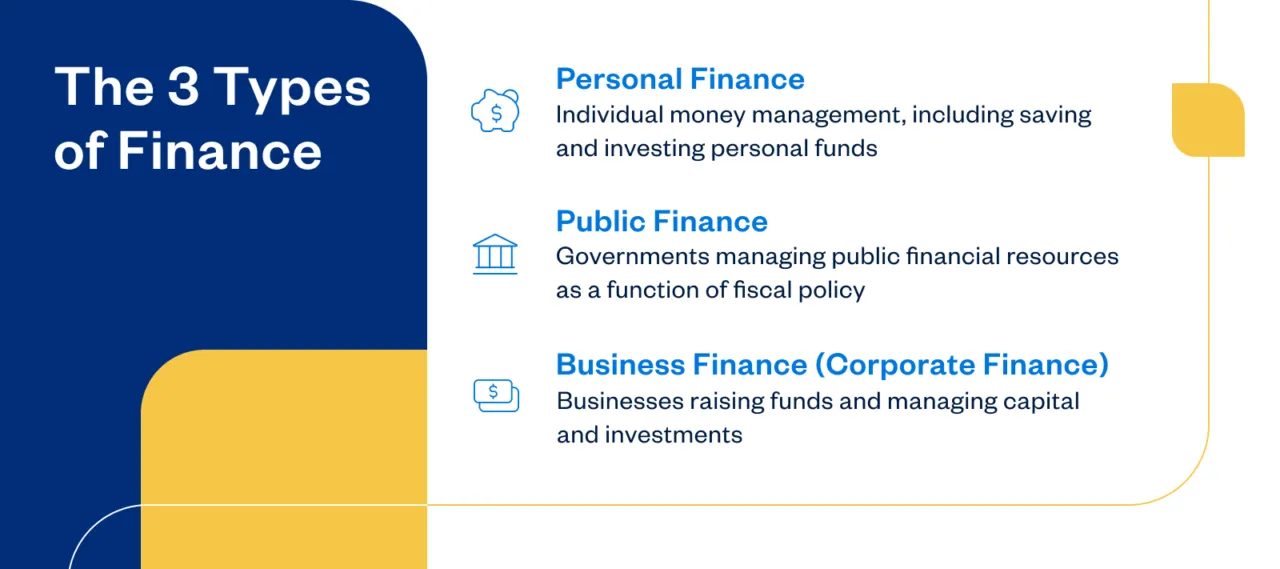Business Finance: Definition and Importance

Mismanaged finances are the biggest threat to most small businesses. According to data from the U.S. Bureau of Labor Statistics, around 20% of small businesses fail within the first year. By the end of their fifth year, roughly 50% have closed their doors.
While some fail due to a lack of market need for their product, stiff competition, or marketing missteps, many fail due to poor business finance. In a CB Insights survey, cash flow was cited as the second-most common reason for failure. Pricing and cost issues were at the top of the list as well.
This is a perfect illustration of just how important business finance is.
But what exactly is business finance? We’ll go through the definition and the meaning, and highlight the sheer importance it has in any size organization.
Here’s What We’ll Cover:
Definition of Business Finance
5 Important Purposes for Business Finance

Definition of Business Finance
Business finance is the funding a business needs for commercial purposes. It is the money business owners require to start, run, or expand a business.
Finance is the foundation of any business. It is nearly impossible to succeed without strong finances in place.
You use finance to purchase assets, goods, and raw materials. Essentially anything that will push your business forward.
This is why finance and funds are known as the lifeblood of any business. You simply cannot function properly unless you have an adequate amount of money accessible to you and your business.

Sources of Business Finance
Financing can come from a number of different places. Some of these include:
Investments
Investors and private equity firms may choose to invest capital in a business in the hopes of seeing their investment rise after a set amount of time.
Business Loans
Some business owners prefer to borrow money from a bank in the form of a business loan and repay it over an agreed period of time.
Crowdfunding
There has been a rise in crowdfunding platforms for business such as Kickstarter, Crowdfunder, and Patreon as many business owners turn to the public as a source of finance when they can’t get a bank loan.
Grants
A grant is a set amount of money that the government, a company, or another organization can award. Grants are advantageous as you do not have to pay the money back. Although they tend to be very difficult to acquire.
5 Important Purposes for Business Finance
Capital is the most important tool when it comes to bridging the gap between your production and your sales. Business finance can be used for a number of purposes. These include:
1. Financial Statements
When dealing with business finance, it’s important to go through your financial statements, including your profit-and-loss statement, balance sheet, and cash flow statements.
Combined, these reports provide an overview of your business’s financial performance.
By doing a financial analysis of these statements, you can see whether you have enough working capital. If there’s a shortage, you’ll get insights as to why, so you can start on strategies to correct it.
Also Read: Financial Statements for Small Business
2. Strategic Planning
Every business should have a solid strategy in place. This is used for planning and providing the financial groundwork for your projections and plans.
If you are looking to expand your business, you will use business finance to tell you how much you’ll have to spend to get things moving.
These strategic plans help you to determine whether or not your company is meeting its long and short-term goals.
3. Borrowing Money
It’s not uncommon to run into cash flow difficulties. When this happens, business finance is a vital tool for managing and understanding the financial implications of borrowing money.
By incorporating this information into your financial data, you can make more educated decisions about how much capital to borrow. You can also decide which options make the most sense and your repayment schedule.
4. Promotion
It’s all well and good to have a great product and business model but to be a successful business, you need people to be aware of you.
The best way to do this is through promotion and marketing. There is a large demand for market research, so most of the time, this does not come cheap. So it’s important to set aside a section of your profits to hire a marketing manager who can ensure your product is accessible and appealing to your target market.
5. Managerial Finance
Do you have enough funds to meet your financial obligations? Do you have the data available to forecast the company’s budget, revenue, expenses, and profits? Will investing in fixed assets generate a return on investment?
Management accounting and financial planning can help you forecast better and make financial decisions that reduce risk and support the growth of the business.

Key Takeaways
Business finance is key for any company. If your finances are mishandled or poorly managed, then you could run into some serious issues down the line.
That’s why getting a grip on your business finance is a top priority and should never be underestimated, whether you’re starting a new business, growing your business, or simply looking to make better business decisions.
About the author
Janet Berry-Johnson, CPA, is a freelance writer with over a decade of experience working on both the tax and audit sides of an accounting firm. She’s passionate about helping people make sense of complicated tax and accounting topics. Her work has appeared in Business Insider, Forbes, and The New York Times, and on LendingTree, Credit Karma, and Discover, among others. You can learn more about her work at jberryjohnson.com.
RELATED ARTICLES


 How to Write a Business Development Plan: A Step By Step Guide
How to Write a Business Development Plan: A Step By Step Guide 6 Finance Equations You Should Know
6 Finance Equations You Should Know What Is Financial Analytics? 6 Reasons Why It is Important
What Is Financial Analytics? 6 Reasons Why It is Important 64 Finance Terms You Should Know
64 Finance Terms You Should Know 5 Best Finance Podcasts You Should Listen to Immediately
5 Best Finance Podcasts You Should Listen to Immediately How to Make Financial Projections for Business
How to Make Financial Projections for Business